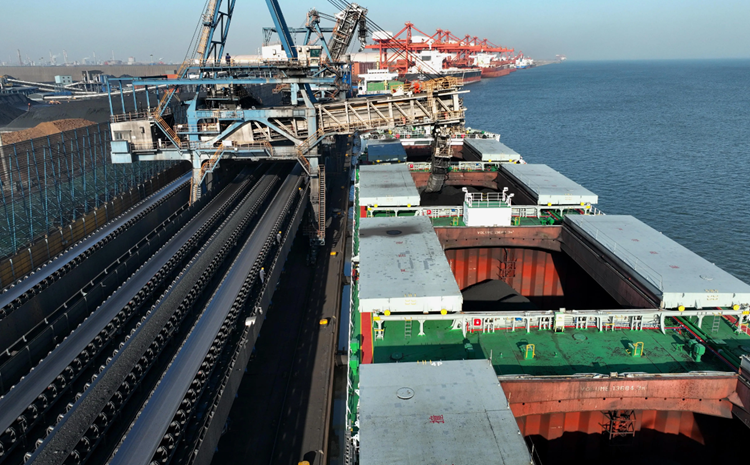Port, an important portal for import and export of goods; port cargo throughput, the national economic development "barometer". A few days ago, China's port operation "half-yearly report" was released: from January to June this year, the number of ships entering and leaving coastal and river ports more than 15.21 million times, cargo throughput of 9.184 billion tons, an increase of 14.35% year-on-year growth of 4.85%, a number of ports have increased throughput significantly.
East China Sea, two world-class ports, reflecting the strong pulse of economic and trade development -
Shanghai Port, the world's largest container port, LNG dual-fuel new automobile ro-ro ship "Minjiangkou" ship berths at Waigaoqiao Haitong Terminal on its maiden voyage, and more than 4,800 domestic brand-name automobiles are orderly sailing into the ro-ro ship to start the voyage to the Persian Gulf. Two days later, the same batch of delivery of "Liaohekou" ship will also berth here, loaded with 4100 commercial vehicles to Europe.
New ship loaded with new cars, the continuation of export fever. In the first half of the year, more than 610,000 domestic cars were exported from Haitong Terminal, a year-on-year increase of more than 27%. This means that more than 3,000 cars leave the sea every day and go to hundreds of countries and regions around the world.
Ningbo Zhoushan Port, the No. 1 port in the world in terms of annual cargo throughput. A batch of photovoltaic modules from JinkoSolar's Jianshan plant in Haining, Zhejiang Province, arrived at Meishan Port, were quickly loaded onto ships and shipped to Saudi Arabia. In the first half of the year, JinkoSolar Haining exported approximately 23,000 containers of products through Ningbo Zhoushan Port to the Middle East, Europe, Asia-Pacific and other regions, representing a year-on-year increase of more than 50%.

Open up new routes and expand new markets. In the first half of the year, Ningbo Zhoushan Port completed cargo throughput of 708 million tons, up 4.2% year-on-year, supporting Ningbo's total import and export value of more than 680 billion yuan in the first half of the year, hitting a record high.
Above the seaport, Ningbo Zhoushan Port as the core, Nanjing, Hangzhou, Suzhou and other 16 ports as the backbone, China's most dense coastal, throughput of the largest port group has become an important platform for smooth domestic and international double cycle. In the first half of the year, the port cargo throughput of more than 9 billion tons, strong evidence of China's economy continues to recover to the good situation - the first half of the year, China's import and export value of trade in goods 21.17 trillion yuan, an increase of 6.1% year-on-year growth, for the first time in the same period in history more than 21 trillion yuan.
The port serves the trade and carries the economic development.
In recent years, port cities have plowed into the high-quality development of ports and made efforts to develop and grow the port economy. Take Tianjin Port as an example, by focusing on the port's advantageous goods and Tianjin's advantageous industries, while consolidating and expanding the scale of petrochemicals, grain and oil processing industries, it continues to attract a number of special industries such as cold chain logistics, cross-border e-commerce, and cruise economy to take root in Tianjin. The latest report of the Ministry of Transportation and Communications shows that last year, the added value of the port economy of China's 59 seaport cities reached 6.2 trillion yuan, accounting for 13.4% of the total economy of these cities. Among them, the proportion of port economy in primary, secondary and tertiary industries in seaport cities reached 15%, 22% and 8% respectively, showing the increasingly significant role of ports in supporting primary and secondary industries.
The port witnesses the economic heat upgrading, and also accumulates new power for development.

Hardware is upgrading. In the first half of the year, China's ports added seven large automated terminals, and the number of automated terminals built and under construction continued to rank first in the world. Based on 5G technology, a new generation of automatic guided vehicles, unmanned container trucks and other intelligent transportation equipment have been put into use, effectively improving the operational efficiency of ports and contributing to the sustained and rapid growth of cargo throughput.
Routes are weaving together. Nearly 90% of global trade in goods through maritime transportation, the number of routes directly related to trade access. To the east of the sea, the first half of Ningbo Zhoushan Port opened three new international routes, the port routes to maintain a high level of 300, for more enterprises to expand the space of the sea; to the west of the extension, this year the opening of the port of Tianjin to Hohhot, Chifeng and other sea-rail intermodal liner, the effective connection between the inland hinterland, the activation of the potential for regional development.
Service optimization. Ningbo Zhoushan Port has innovated to realize "one declaration, one inspection and one release" for export containers of sea-railway intermodal liner train, which helps Yiwu Commodities reach the world quickly; Guangzhou takes Nansha Port as the hub port and the ports along the Pearl River as the feeder ports to form "two ports such as one port". The operation mode of ...... port construction is "soft connection", turning cargo flow into development increment.
The port is connected to the four seas, and the land is connected to the eight directions. Huge ships are shuttling to and fro, and cranes are busy working, weaving a vivid picture of development.

